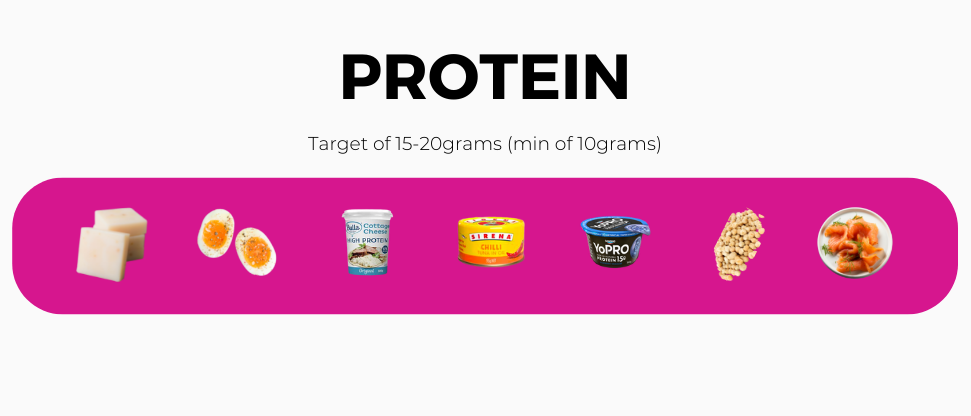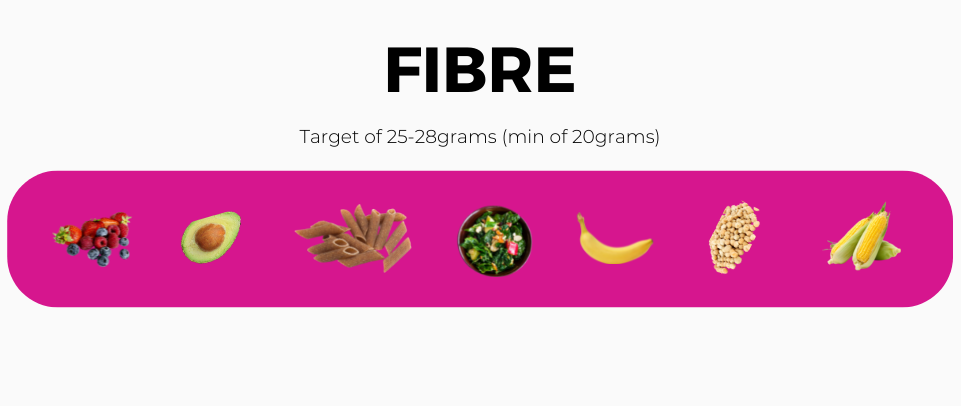Why am I always hungry? Symptoms, causes and solutions for feeling hungry all the time
Being hungry often can be caused by a lack of specific nutrients in your diet or simply not eating enough food.
Other lifestyle factors can play a role, including sleep and stress levels. Here’s what you need to know and, more importantly, some solutions by NETFIT Dietician Jess Spendlove.
Hunger symptoms can present in a range of ways which include:
- Empty stomach
- Stomach growling
- Headache
- Light-headed feeling
- Grumpiness (hangar is a thing!)
- Lack of energy
- Shakiness/weakness
If you recognise any of these symptoms, let’s take a look at what may be causing them below.
1. You’re not eating enough protein.
Protein plays a vital role in appetite control by regulating your hunger hormones. Therefore, you may feel hungry frequently if you don’t eat enough of it. Some example foods you can add to your diet could be cheese, eggs, yoghurt, tuna or salmon.

2. You’re not eating enough fibre.
Fibre plays a role in reducing your appetite and keeping you full. If your diet lacks fibre, you may find that you are always hungry. Some example foods to increase your fibre intake could be avocado, wholewheat pasta, banana, corn and lentils.

3. You’re not eating enough fat.
Fat slows digestion and increases the production of fullness-promoting hormones. Therefore, you may feel hungry often if you don’t eat enough fat. Healthy fats you can add to your diet could be avocado, olive oil, fatty fish or peanut butter.
4. You’re drinking enough water.
With more than 50% of the body being water, hydration status influences many functions, including digestion and appetite. If you’re dehydrated, you may mistake feeling thirsty for feelings of hunger.
5. You’re getting enough sleep.
Sleep deprivation is known to cause fluctuations in your hunger hormone levels and may leave you feeling hungry more frequently.
6. You’re always stressed.
Excessive stress may be why you may be hungry frequently, given its ability to increase cortisol levels in the body.
7. You exercise a lot.
Individuals who regularly exercise at a high intensity or for extended durations can have greater appetites as they have greater energy output. It is essential to be consuming enough food to meet your requirements.
So what can we do to fix this?
Let’s look at the solutions
When it comes to the nutrition side of things, here is what you should do.
All the elements at meals and snacks – One of the most essential solutions is ensuring you have protein, wholegrain carbohydrates, colours and healthy fats at each main meal and snack. Each of these elements has an important role, and as discussed above, a lack of protein, fibre and fat can lead to feeling hungry.
As a general guide, when looking at your plate, aim to have 1/3 plate protein, 1/3 whole grain carbohydrates, and 1/3 colours with some healthy fats. Regarding snacks, aim to have at least 10g protein, wholegrain carbohydrate and some colours. If you can squeeze some healthy fats in there, it is an A+.

Eat more on the days you train more – It can be challenging to eat more around hard training sessions, but having the knowledge you need to do this and then practising applying it is essential. Liquids can be an excellent way to get more in, like a smoothie, if you struggle to eat more due to nerves or suppressed appetite following a hard training session or game.
NETFITTER’S, ultimately if you are hungry it is a sign you need to eat more. Food should not be feared; it should be loved and used to fuel your bodies and minds!
Screenshot the below for a game day meal guide, or the day before.

Use these tips as a framework to help you feel satisfied and fuelled!
Want to see more of Jess Spendlove’s top tips? Head to her Instagram to learn more: https://www.instagram.com/jess_spendlove_dietitian/

